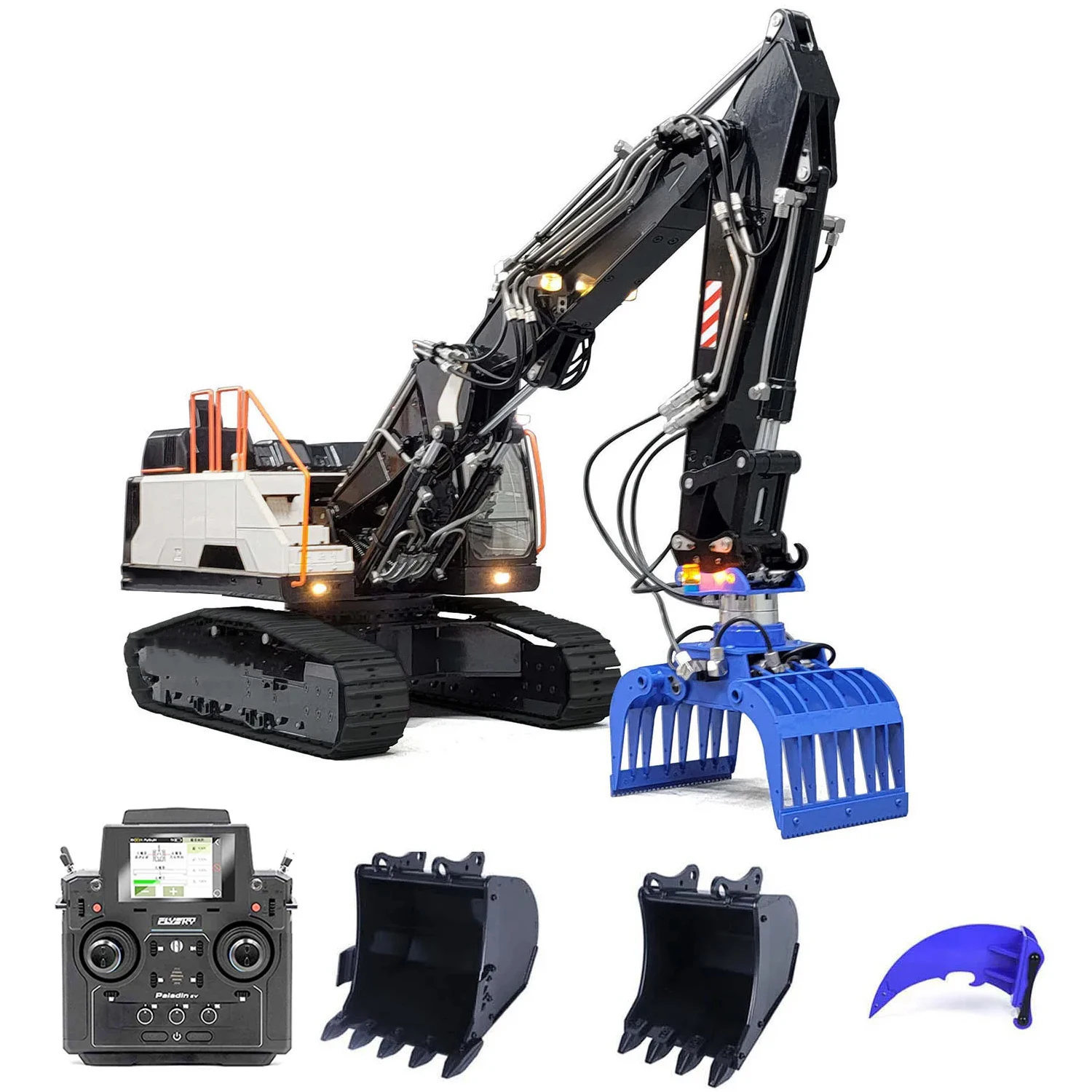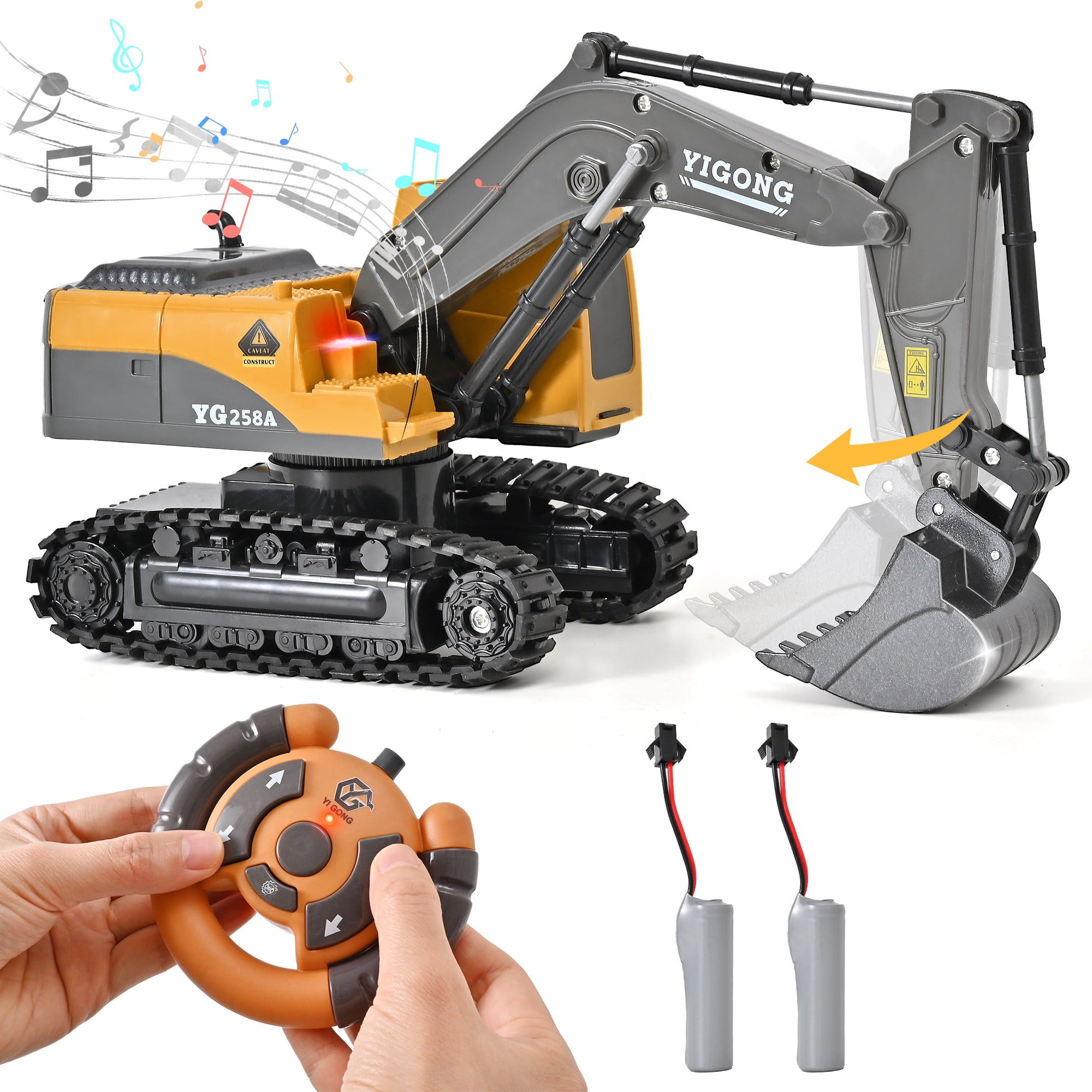The Top Benefits of Using a remote control excavator in Demolition Tasks
Wiki Article
Recognizing Just How Excavator Functions and Its Effect On Performance
Excavators play a crucial role in construction and mining operations, relying upon a complicated interaction of mechanical and hydraulic systems. Their capacity to perform a variety of jobs hinges on both their design and the modern technology integrated within. Comprehending these components can significantly influence operational effectiveness and performance. As advancements continue to improve the industry, one should take into consideration how these modifications will certainly affect future practices and performance.The Essentials of Excavator Mechanics

The Role of Hydraulic Systems in Excavators
At the heart of excavator operation lies the hydraulic system, which plays an essential function in powering the maker's activities and features. This system makes use of pressurized hydraulic liquid to move power, making it possible for numerous activities such as lifting, swinging, and excavating. By utilizing the principles of hydraulics, excavators can carry out tasks with amazing precision and force, improving total functional efficiency.The hydraulic system includes vital components, including cylinders, valves, and pumps, which collaborate to control the flow and direction of the fluid. When the operator engages the controls, the hydraulic liquid is guided to certain cyndrical tubes, translating the operator's commands right into physical activity. This system enables smooth and responsive activities, which are crucial in building and construction and excavation atmospheres. double e volvo rc excavator. The effectiveness of the hydraulic system straight affects the productivity and convenience of the excavator, making it a crucial aspect in modern excavation proceduresKey Elements of an Excavator
Comprehending the essential parts of an excavator is vital for grasping just how this powerful maker operates. An excavator is composed of several substantial aspects, consisting of the undercarriage, home, arm, container, and boom. The undercarriage provides security and movement, usually featuring tracks or wheels to navigate numerous terrains. Your home includes the engine and hydraulic systems, permitting the driver to manage activity and power the device. The boom expands from the house, making it possible for vertical reach, while the arm attaches to the bucket, promoting digging and training operations.Additionally, the taxicab houses the driver, outfitted with controls for accurate handling. Each of these parts plays an important function in the excavator's general capability, adding to its effectiveness and efficiency on building and construction sites. Understanding these parts assists in keeping and maximizing excavator performance, making certain jobs are finished securely and effectively.Attachment Flexibility and Its Advantages
Accessory adaptability is an essential aspect of excavators, allowing operators to change between different devices customized for certain jobs. This flexibility not just boosts work performance yet additionally adds to cost-effectiveness by minimizing the requirement for numerous equipments. Recognizing the various kinds of add-ons offered can considerably influence the general efficiency and performance of an excavator on task sites.Sorts of Attachments
While excavators are primarily recognized for their digging capabilities, their real adaptability depends on the large variety of accessories available. These attachments improve the excavator's functionality, allowing it to carry out various tasks past excavation. Typical accessories include buckets (for excavating and scooping), hydraulic thumbs (for grasping products), and augers (for piercing holes) Grapples are used for moving and taking care of particles, while rippers can break up difficult surfaces. Other specialized add-ons, such as trenchers and rakes, allow excavators to adapt to details task needs. This diversity not just boosts the machine's energy across various industries, consisting of building, landscaping, and demolition, however also enables drivers to tailor their tools to meet details project needs efficiently.Boosted Job Effectiveness
Making best use of task performance is a primary advantage of making use of various excavator add-ons. Various attachments enable an excavator to execute multiple tasks without requiring to switch over devices, conserving valuable time and labor. For example, making use of a hydraulic hammer can break concrete while a pail attachment can excavate soil, allowing a smooth operations. This flexibility minimizes downtime connected with tools adjustments and boosts productivity on-site. Furthermore, specialized accessories enhance accuracy in jobs such as grading or landscape design, bring about greater top quality end results. The capacity to adjust to numerous work requirements not just streamlines operations but also minimizes the need for additional equipment, making certain that tasks are finished promptly and effectively. Overall, attachment versatility considerably adds to raised work effectiveness in excavation work.Cost-Effectiveness and Flexibility
Cost-effectiveness is a significant advantage of utilizing versatile excavator attachments. These add-ons permit a single excavator to do several tasks, reducing the demand for added equipment and labor - double e volvo rc excavator. By changing between buckets, hammers, and grapples, operators can deal with various tasks, from digging to demolition, thus taking full advantage of devices utilization. This flexibility not only lowers functional costs yet likewise reduces downtime related to altering equipment. In addition, the capability to personalize excavators with specialized attachments boosts performance, as they can successfully deal with varied tasks according to project needs. To wrap up, the mix of cost-effectiveness and adaptability in excavator attachments adds to improved functional efficiency and source allocation in building and construction and excavation projects
Advanced Technology in Modern Excavators
Modern excavators are increasingly outfitted with sophisticated technology that changes excavation procedures. Automation improves operations, while boosted fuel efficiency minimizes operational prices. Furthermore, smart control systems boost precision remote control excavator and safety, noting a considerable advancement in excavation devices.Automation in Excavation Processes
As excavation technology advances, automation has become an important component in boosting effectiveness and accuracy on task sites. Modern excavators are furnished with advanced automated systems that promote tasks such as grading, excavating, and trenching with minimal driver intervention. These systems use sensing units, GPS, and artificial intelligence algorithms to assure accurate positioning and deepness control, significantly lowering the margin for error. Furthermore, automation permits operators to focus on critical decision-making instead of hands-on controls, leading to improved efficiency overall. Such developments not just streamline process however additionally enhance security by lessening human mistake in complex operations. Subsequently, the assimilation of automation in excavation processes represents a significant innovation in construction technology, driving the industry towards higher performance and performance.Enhanced Fuel Effectiveness
Improvements in innovation have actually additionally brought about substantial renovations in gas performance for modern excavators. Modern equipments are equipped with advanced engines that optimize power output while reducing gas intake. These engines make use of cutting-edge combustion technologies, such as turbocharging and straight gas shot, to boost efficiency and effectiveness. Furthermore, lightweight materials in construction reduce total weight, permitting much less power expense during operation. The intro of variable rate controls allows operators to adjust engine efficiency according to specific jobs, better lessening gas usage. As an outcome, these enhancements not only lower functional expenses but also add to ecological sustainability by decreasing emissions. Overall, improved fuel efficiency in excavators is an important growth that boosts productivity and financial practicality in the construction sector.Smart Control Solution
While drivers navigate increasingly intricate task websites, wise control systems in excavators have actually become essential devices for enhancing performance and precision. These innovative technologies make use of algorithms and sensing units to monitor different parameters such as tons weight, surface conditions, and functional performance. By immediately readjusting hydraulic functions, clever systems optimize maker efficiency, causing boosted productivity and lowered wear on elements. In addition, operators gain from intuitive interfaces that give real-time feedback and diagnostics, permitting educated decision-making. This integration of innovation not just streamlines operations however additionally minimizes human error, adding to much safer workplace. As the construction market remains to progress, clever control systems will certainly play a vital role fit the future of excavator effectiveness and performance.Enhancing Functional Performance With Excavators
Excavators play a vital function in boosting functional performance throughout numerous building and construction and excavation projects. Their versatility allows for multiple tasks, including material, training, and excavating handling, which simplifies operations and lowers the demand for extra devices. With effective hydraulic systems, excavators can do durable tasks with precision, considerably decreasing the time required to full tasks. The assimilation of sophisticated innovation, such as general practitioner and automated controls, additionally enhances their operation, making it possible for drivers to accomplish higher accuracy and reduce product waste. In addition, contemporary excavators are created to take in less gas and decrease discharges, contributing to both cost financial savings and ecological sustainability. By utilizing excavators effectively, construction groups can improve productivity, fulfill job due dates, and improve general site monitoring. This multifunctionality and effectiveness make excavators important tools in the modern-day building landscape.The Future of Excavators in Construction and Mining Industries
As the building and construction and mining sectors develop, the future of excavators is positioned for considerable transformation driven by technical development and transforming operational needs. Advancements in automation and artificial intelligence are improving excavator capabilities, permitting for enhanced accuracy and efficiency in procedures. Autonomous excavators are arising, decreasing the requirement for human intervention and lessening the risk of accidents.Moreover, the integration of telematics and IoT innovation makes it possible for real-time surveillance of machine efficiency and anticipating maintenance, enhancing uptime. Eco-friendly styles, consisting of electrical and hybrid designs, are obtaining traction, lining up with sustainability objectives within the industry.Additionally, the usage of advanced materials and lighter styles boosts gas efficiency while preserving efficiency criteria. As these fads progress, excavators will play a crucial duty in fulfilling the increasing demands for productivity and security in building and construction and mining, inevitably changing functional landscapes.Frequently Asked Questions
Just How Do Climate Condition Influence Excavator Efficiency?

Climate condition significantly influence excavator efficiency, as rainfall and mud can impede traction and stability, while extreme temperature levels might impact hydraulic systems. Operators needs to adapt to these variables to guarantee ideal capability and safety and security during operations.
What Precaution Should Operators Adhere To While Making Use Of Excavators?
Safety steps for excavator operators consist of wearing proper personal safety devices, conducting pre-operation examinations, making sure proper interaction with ground personnel, keeping a risk-free range from above hazards, and sticking to recognized functional protocols to stop mishaps.How Commonly Should Excavators Be Maintained for Optimum Performance?
Excavators need to be maintained regularly to ensure peak efficiency, usually every 250 operating hours or as defined by the producer. Regular checks enhance dependability, prevent unforeseen breakdowns, and prolong the life-span of the equipment.
What Is the Typical Life-span of an Excavator?
The average life expectancy of an excavator commonly ranges from 10,000 to 15,000 hours of procedure. Variables influencing durability include maintenance techniques, operating conditions, and the high quality of the machine itself, impacting general performance and efficiency.
Can Excavators Operate Uneven Surface Efficiently?
Excavators can run efficiently on uneven surface because of their verbalized styles and adjustable tracks. These attributes enable them to maintain security and traction, enabling effective operation in challenging settings frequently encountered in building and construction and landscaping tasks. Each of these components plays a crucial role in the excavator's general capability, adding to its efficiency and performance on building websites. Making best use of job effectiveness is a key benefit of using various excavator accessories. While drivers navigate progressively intricate job websites, clever control systems in excavators have emerged as vital devices for enhancing efficiency and accuracy. Excavators play an essential function in boosting operational effectiveness throughout numerous construction and excavation projects. Developments in automation and fabricated knowledge are reshaping excavator capabilities, enabling for boosted precision and effectiveness in procedures.Report this wiki page